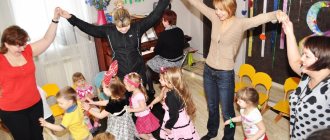Work plan for the week in the preparatory group on the topic: Victory Day
Plan of educational work with children 6-7 years old.
Topic: “Victory Day” Program content: 1. Consolidating children’s knowledge about the Great Patriotic War, about the army - the defender of our country, about the feat of the people who stood up to defend their Motherland. 2. Development of interest and respect for the heroic events of the past, the military glory of the Russian people. 3. Fostering moral feelings (love, responsibility, pride) towards people of the older generation, respect for the defenders of the Fatherland. It is advisable to include in the content of a subject-based developmental environment on the topic for children’s independent educational activities: - photographs, illustrations on a military theme, depicting military personnel of various types (sailors, border guards, tank crews, pilots, missilemen, etc.); - illustrations: Zaitsev “War and Peace through the eyes of an artist”, S. Prisekin “Our cause is just”, Y.M. Neprintsev “Rest after the battle”, V.M. Sibirsky “Storm of Berlin”, A. Krivonogov “Victory”; - an album with images of medals and orders of the war years; — attributes for the role-playing game “At the outpost”, “We are tankers”, “Military Hospital”; — building materials, plans for creating militarized equipment; — books, postcards, stamps on the theme of Victory Day; - Lego; — ring throws, equipment for overcoming obstacles, throwing. - collection of sets of toy soldiers; — mini-museum of military equipment; - collage “At the Parade”, - recommendations for creating the album “Our Great-Grandfathers Fought”; — a booklet with lyrics for singing together; — a disc with a music video “Victory Day” music. D. Tukhmanova. To carry out educational activities in the family on the topic, it is advisable to recommend that parents: - talk with children about natural resources, about the peoples inhabiting Russia, famous people, about the exploits of people during the war; - watch the TV program “Parade on Red Square” - show the power and strength of the Russian Army; — visit historical places of your hometown; — consider the festive decorations of the city; — watch the fireworks display with your children; — congratulate great-grandfather and great-grandmother; — visit Victory Park at ChTZ, the museum of military equipment; — lay flowers at monuments of military glory; - select images of military equipment, soldiers, etc. for the theme “Victory Day” from newspapers and magazines to create a collage; — take part in the publication of the photo newspaper “Defenders of the Fatherland”; — create an album with photos, drawings, and a child’s story; — contribute to the book of healthy recipes “Soldier’s Porridge”; — read to children: Yu.M. Neprintsev “Rest after the battle”; — watch films about war heroes, discuss together; — consider stamps and badges on the theme “Victory Day”; - listen at home: “Great-grandfather. Victory Day" music. A. Ermolova, “Victory Day” music. Trubachev, “Alexandrovsky Garden” music. E. Tsibrova, “Katyusha” music. M. Blanter, “Three Tankers”; — view the film: “Cornflower” Soyuzmultfilm 1973, “A Soldier’s Tale”, “Grandfather’s Binoculars” Soyuzmultfilm 1982, “Partisan Snow Maiden” Kievnachfilm 1981; — take part in the competition for the best model of military equipment. Formation of interpersonal relationships between children: May - 2nd week 1. Organization of the role-playing game “Guests” The goal is to show in a playful way exemplary “scenarios” for receiving guests and staying as guests, to help children draw conclusions regarding the correct behavior in relation to guests. 2. Reading the fairy tale by A. Milne “Winnie the Pooh and all-all-all” (chapter 2. “In which Winnie-the-Pooh went to visit, but found himself in a hopeless situation”) The goal is to introduce the rules of behavior when visiting. 3. Conversation on the topic “If guests come to you...” The goal is to form a positive attitude towards people, to introduce them to the rules of behavior when receiving guests. Day of the week NOD Educational activities carried out during regime moments Individual work Wednesday May 10, 2016 Cognitive development Conversation “Acquaintance with different branches of the military” (infantrymen, tank crews, sailors, pilots, missilemen, border guards). C: consolidate knowledge of how military personnel of various types bravely fought and defended our country from enemies during the Great Patriotic War. Teaching literacy Doronova T.N. Lesson No. 28 “Sound (sch)” C: teach children to identify the syllable in a word by counting in which the sound (sch) is found. Music (according to the plan of the music director) ISOD (modeling) 1st half of the day Morning exercises. Conversation with children “The Great Patriotic War” Purpose: to acquaint children with the exploits of schoolchildren heroes, to cultivate a sense of patriotism. Looking at books, illustrations, postcards about the war. Goal: to introduce children to the exploits of people on the front line and in the rear. D/I “What types of troops do we know?” Goal: to consolidate knowledge about the branches of the military. D/I “Who needs what for the service?” Goal: consolidate knowledge about the purpose and type of activity of various troops. Board game “Military training ground” Purpose: to develop the ability to play in small groups Walk card No. 32 Work before bed Cultural and hygienic procedures. Reading fiction: L. Kassil “Your Defenders” 2nd half of the day Gymnastics after sleep. S/R game “We are military” Goal: to develop the ability to develop the plot of the game in accordance with the theme, consolidate knowledge about the branches of the military, and pay attention to children’s vocabulary. Reading the story “Dugout” by A. Mityaev Purpose: to introduce children to the work, to evoke a desire to express their impressions of what they read. D/I “What does a soldier have in his duffel bag?” Goal: enrich children's vocabulary, activate relevant concepts. Card No. 32 D/I “Find a Pair” Purpose: to exercise the ability to solve arithmetic examples (Gleb, Andrey, Nastya) Duty in a corner of nature - caring for indoor plants. Goal: to cultivate a desire to care for plants and carry out work assignments. (Misha, Kirill K.) Day of the week GCD Educational activities carried out during regime moments Individual work Thursday May 11, 2016 FEMP T.A. Shorygina “Number 12” Physical development (according to the plan of physical tools) ISOD (applique, manual labor) Collage “Walk of Fame” (family military chronicle). C: to develop children’s creative abilities in artistic and design activities. 1st half of the day Morning exercises. Conversation with children “They fought for the Motherland” Goal: to cultivate patriotic feelings, love for the Motherland, respect for the participants of the Second World War. D/I “Say a word” Goal: consolidate knowledge about military professions, develop the ability to select words and rhymes. D/I “The Fourth Extra” Goal: to develop logical thinking. Games with building materials “Building a trench” Goal: to develop design abilities and the ability to bring a plan to completion. Walk card No. 33 Work before bed Cultural and hygienic procedures. Reading fiction: S. Marshak “Border Guards” 2nd half of the day Gymnastics after sleep. Situational conversation “Do soldiers need rules of conduct?” Goal: to cultivate the ability to comply with the rules of safe behavior S/R game “Sailors” Goal: to consolidate knowledge about naval military professions, cultivate a sense of patriotism, and a desire to serve in the Army. D/I “Encrypted word” Purpose: to train children in the ability to isolate the first sound in a word, designate it with a letter, compose words from letters and read them. Board game “Battlefield” Purpose: to develop the ability to follow the rules of the game. Card No. 33 Dining duty Goal: to consolidate the ability to set tables for breakfast. (Andrey, Gleb) D/I “What time is it?” Goal: to consolidate the ability to show time on a clock model, to tell the time according to the indications of the hands. (Matvey, Denis) D/I “Lay out a figure” Goal: to teach how to lay out military equipment from geometric figures. (Grisha, Misha) Day of the week NOD Educational activities carried out during special moments Individual work Friday May 13, 2016 Speech development Compiling the story “Victory Day in my family.” C: to improve children’s ability to compose stories about the Victory Day holiday, observing the structure of the narrative. Physical development (according to the physical tools plan) 1 half of the day Morning exercises Conversation with children “Monuments and obelisks in honor of fallen heroes” Goal: to introduce children to famous monuments in honor of fallen heroes in Russia and abroad. D/I “Assemble a picture” (military theme) Purpose: to teach how to create a whole from parts, to identify winners in the game. Games with building materials “Bridge for crossing” Purpose: to learn to identify the main parts of a building in a drawing, convey their spatial relationship, and select additional details. Walk card No. 34 Work before bed Cultural and hygienic procedures. Reading fiction: A. Mityaev “Bag of Oatmeal” 2nd half of the day Gymnastics after sleep. Conversation with children “Get up, huge country...” Purpose: to generalize knowledge about the Second World War, to cultivate a sense of pride for the Motherland, its defenders, and respect for Second World War veterans. D/I “Planes are flying” Purpose: to exercise the ability to navigate on a sheet of paper. Game “Flies or doesn’t fly” Purpose: to develop memory and thinking Memorizing proverbs, sayings about honor, duty, soldier’s service, friendship and camaraderie. Board game "Who's the fastest to the halt?" Goal: to develop the ability to follow the rules of the game. Learning physical education Goal: to develop the ability to coordinate movements with the text. Card No. 34 D/I “Pathfinders” Purpose: to develop orientation skills according to a plan-map, the ability to correctly determine the relative position of objects in space, to “read” symbols and notations. (Anya, Ksyusha, Nastya) D/I “Magic Figures” Purpose: to exercise the ability to transform geometric figures into military equipment (Matvey, Denis) Duty in a corner of nature - loosening the earth in flower pots, wiping the leaves of plants. Goal: to develop the ability to care for plants. (Natasha, Vera, Roma)
We recommend watching:
Thematic planning for the year in the preparatory group for the Federal State Educational Standard. Modeling and appliqué Planning in the preparatory group of a kindergarten on the topic “Family” Long-term plan for working with parents in the preparatory group for the school year Long-term planning for FEMP in the preparatory group according to the Federal State Educational Standard for the year
Similar articles:
Thematic planning on traffic rules in the preparatory group of preschool educational institutions
Key principles for creating a theme week plan
To organize the process of considering the topic of the week, it is important for a teacher working with children of any age not to miss the following points:
- the teaching load must correspond to the age of the pupils - therefore, even the most fascinating story on the topic with games and creative tasks on the GCD must fit within the established norms for the duration of classes in the preparatory group - 30 minutes;
- materials for work should be selected taking into account the general level of development of the children in the group;
- joint and independent activities should alternate;
- the plan should include all types of organization of educational activities - educational activities, matinees, special moments, project development, for example, in the format of publishing a wall newspaper;
- the plan should reflect the integration of educational areas (cognition, speech development, physical, social-communicative, artistic and creative development);
- the presentation of the material should be based on the level of performance of the pupils - for example, the topic “Children at War” in the morning is implemented in the form of an educational activity with a story about the children’s feat, and in the afternoon, during independent work, a drawing on the topic “Children of the Regiment”;
- correlation with the thematic plan is also a prerequisite for drawing up a plan for the thematic week - that is, the implementation of the tasks set by the educational program, in particular, repetition of key aspects of the topic (main battles, names of commanders, names of major memorials, etc.).
The calendar plan for the thematic week includes all types of educational activities
The essence of preparing a calendar plan for a thematic week for Victory Day for the middle group
The mission of planning a theme week is to:
- selecting methods and techniques for working with children that help reveal the essence of the “Victory Day” theme in the most accessible way - for example, for children in the middle group, a visual display technique will be productive, that is, watching multimedia presentations, excerpts from films;
- determining appropriate forms of interaction with preschool children (in the middle group the emphasis is on joint work with adults);
- compiling a list of objects of the subject-development environment that will contribute to understanding the topic (for example, joint creation of lapbooks on the topic with parents, publication of wall newspapers, etc.).
The subject-development environment creates the necessary surroundings, helps to tune in to studying the topic, and also organizes materials for educational activities and matinees.
The objectives of planning a thematic week are:
- methodologically justified distribution of the studied material according to the forms of organizing interaction with children - for example, expanding ideas about military professions can be organized through guessing riddles while walking;
- determining the goals of each type of work in the context of a specific type of educational activity - for example, in a lesson on speech development to achieve the goal of expanding ideas about the holiday and events of the Second World War, the plan includes a conversation based on an information block with a short story about the Second World War;
- a brief formulation of the content of a particular type of work, for example, the conditions of the game “Cavalry” in a physical education lesson can be formulated as follows: “children jump, sitting on a ball, from one pin to another and back”;
- logical composition of the week - at the beginning - NOD, organization of project work, excursions, etc., and at the end - a matinee or concert.
The matinee is the final event of the thematic week
Components of the thematic week calendar plan
Regardless of the group for which the plan is drawn up, it includes all types of organization of interaction with children:
- GCD in educational areas - familiarization with the outside world, FEMP, speech development, physical education, drawing, music, modeling/appliqué;
- excursions, visiting a museum, library;
- routine moments - for example, before going for a walk, children practice the speed of putting on their shoes, imagining themselves as soldiers during a combat alert;
- leisure activities - matinee, sports festival.
In addition, the plan organizes types of work according to methods of interaction:
- working together with an adult;
- independent work of children;
- cooperation with parents.



